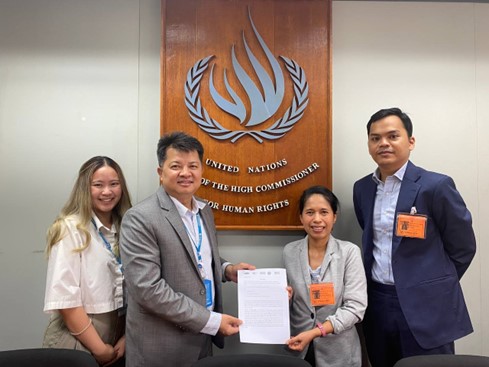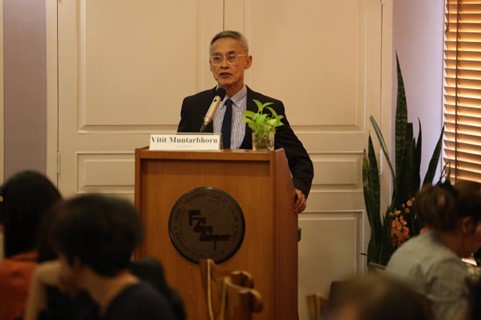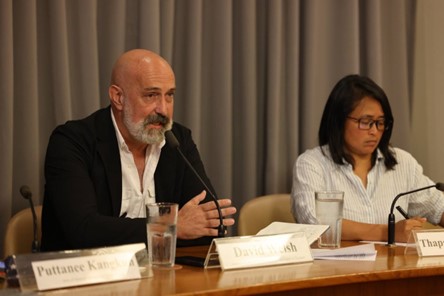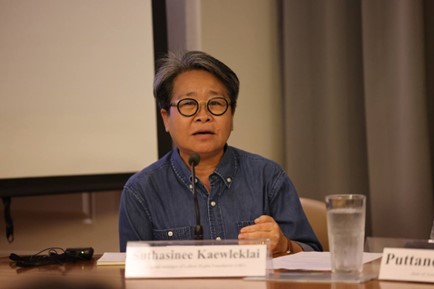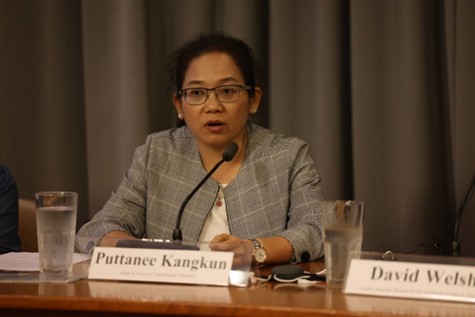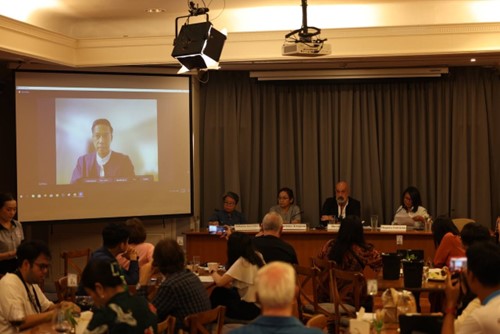Prior to the election of the UN Human Rights Council in October 2023:A compilation of a summary of public discussion + public statements + open letters reflecting perspectives on the state of labour protection and migrant population
11 March 2024, in its open letter to the UN High Commissioner for Human Rights, the Migrant Working Group (MWG) describes its stand and offers its recommendations to the Thai government prior to the election of the UN Human Rights Council with a copy sent to the Prime Minister, the Minister for Foreign Affairs, Chair of the House Committee on Foreign Affairs, the House of Representatives, and Chair of the Committee on Legal Affairs, Justice, and Human Rights, the House of Representatives. In essence, it calls for the development of mechanisms to enhance the protection and protection of human rights among migrant workers and refugees.
Civil society handing letter to the UN High Commissioner for Human Rights
The open letter offers the Migrant Working Group (MWG)’s recommendations to the Thai government prior to the election of UN Human Rights Council pursuant to the cabinet resolution on 23 August 2022 acknowledging the application as a member of the UNHRC for the term of 2025-2027 with its election to be held in October 2024 (read more here https://hrdfoundation.org/?p=3716 )
Thailand should treat ‘migrants’ based on human rights principle, an emphasis on the use of immigration law shall disproportionately affect refugees
Professor Emeritus Vitit Muntarbhorn, Faculty of Law, Chulalongkorn University
And UN Special Rapporteur in his keynote speech
On the past 1 March, from 17.00 – 20.15 at the Foreign Correspondents’ Club of Thailand (FCCT), a civil society network including the Migrant Working Group (MWG), the Human Rights and Development Foundation (HRDF), the Solidarity Center in Thailand, and the Environmental Justice Foundation (EJF) issued a statement to show its stand and offer the MWG’s recommendations to the Thai government prior to the election of the UN Human Rights Council (read more here https://hrdfoundation.org/?p=3669) and organized a public discussion on “Thailand’s candidature for the UN Human Rights Council (HRC): From the viewpoints of the state of labour and migrant protection”. They called on the Thai government to develop mechanisms to enhance the protection and protection of human rights among migrant workers and refugees prior to the election of the UN Human Rights Council in October 2024. In sum, the meeting calls on Thailand to create an arrogance and confidence among international community that they are sincere and determined to protecting human rights of all groups of people and to ensure migrant workers, refugees, migrants and the people in Thailand shall receive the protection and care based on human rights principle in order that Thailand can pride itself for being a member of the UN Human Rights Council.
“The most consequential impact is the use of immigration law. In certain instances, flexibility should be made to allow them to come in based on policies. Such law has become a issue worldwide since it may not address the problem. What if the government of the country of origin does not protect its own people? According to the immigration law, it is assumed that these incoming people are supposed to the protected by the government of their native country. But this does not take into account if they have fled here. In such case, the immigration law should not apply to the asylum seekers” said Vitit Muntarbhorn.
Professor Emeritus Vitit Muntarbhorn, Faculty of Law, Chulalongkorn University and UN Special Rapporteur in his keynote speech on “Thailand and the UN Human Rights Council: The second agenda?” essentially said that situation of labour protection of migrant workers and refugees is quite concerning. As Thailand has declared its intention to run as a candidate member of the UN Human Rights Council, there have been problems happening at the Mae Sot border including the crackdowns on the gangs of scammers and the repatriation of the grey Chinese mafia and more than 900 victims back to China. The situation at the Thailand-Myanmar border also garners attention from the world over. There are also human rights issues in Thailand. One of the cases in point is a remnant from the dictatorial regime including the prosecution of child and youth activists who have exercised their right to public assembly in a democracy. More than 280 of them in Thailand have been charged for exercising their right to public assembly. We therefore call on the power that be to withdraw all the charges against such young activists and to allow them to exercise their rights and freedoms as prescribed in the Constitution. I want to focus on the attempt by Thailand to be a member of the UN Human Rights Council for the term of 2025-2027 and the election will be held in New York City in the next six months. Political rights and freedoms asides, another intersecting issue on top of the economy and human rights is how the Thai government treat the “irregular migrants” in Thailand and the concerned humanitarian issues. These asylum seekers can be divided into four groups including;
1. People who have fled from persecution and armed conflicts are often viewed as illegal migrants by the Thai state. Internationally, (1) Thailand is not a state party to the Convention on Refugees, and (2) Thailand is a state party to only seven of the nine international human rights treaties which can be applied to ensure protection including Article 13 of the International Covenant on Civil and Political Rights (ICCPR) which “prohibits arbitrary repatriation of an alien from the country including an asylum seeker”. In addition, there are other international laws including the UN Global Compact (UNGC) and various international forums at which Thailand has pledged to uphold human rights. Meanwhile, in Thailand, the state continues to treat the migrants exclusively from the perspective of the Immigration Act without considering that they are a part of people who have fled from unrest in other state. On a positive note, Thailand has enacted the Act on Prevention and Suppression of Torture and Enforced Disappearance whose provisions are founded on the non-refoulement principle, the prohibition of repatriation a person to a place where they have may face a deadly harm. The law has to be applied more. Legislatively, our laws are generally not too discriminatory, albeit their enforcement is lax including law on education. The refugees in the temporary shelters, over 90,000 them, are well take care of by Thailand, and the effort can be improved. Particularly, those living in the camps should have the chance to further their education to the university level. They should have access to proper documentation and document certification. Given a lack of effort to ensure these people can develop their potential properly, it has given rise to the attempt to land a job illegally. Thailand should give these people a chance to become part of the labour force in the country.
2. The newly arrivals from Myanmar in the wake of the military coup on 1 February 2020 There are tens of thousands of them and they have come here through a wave of migrations, although some have been pushed back. For this group, I have three demands including (1) allow them to come in temporarily, (2) no push back, and (3) respect their basic rights to food, water, education and public health.
3. The Cambodians These people are a political sensitive issue. I call on Thailand to stop deporting them. They should be allowed to stay here temporarily, have their basic rights and freedoms protected. But in the past couple of years, Thailand has deported these people causing at least a coupe of them having been sent back and face jail term in Cambodia.
4. The urban refugees from various nationalities There are around 5,000 of them in Thailand and they are allowed to stay here temporarily. Since the regulation on National Screening Mechanism to protect them has been adopted, it should be enforced. The problem is who can apply for the status of “protected person”? According to the latest version of the regulation, general aliens are not qualified, only those who have fled from war can apply for the status. Therefore, I call for the enforcement of the mechanism since we have been asking for it for 30 years and it should be monitored by the UNHCR. This minimum protection is crucially important. In the future, they may be resettled in a third country or return to their country of origin. But such migration has to be carried out safely.
For the stateless and nationality-less persons, there are three issues; (1) the international forums that Thailand has been involved, (2) the laws and policies in practice, and (3) the solutions. There are two international treaties concerning the stateless and nationality-less persons including the 1954 Convention relating to the Status of Stateless Persons and the 1961 Convention on the Reduction of Statelessness, and Thailand is a party of neither of the treaties. According to the Conventions, a stateless and nationality-less person shall be bestowed with the nationality from the country in which they were born. Nonetheless, Thailand is a state party to seven of the nine treaties which apply to non-discriminatory access to education and birth registration. The solutions are (1) a child born in Thailand and has no nationality shall be given Thai nationality. We should put this on the table. If they are born here, they shall receive Thai nationality. (2) A person who was born outside Thailand and had no nationality, they should be offered a residency and allowed to work. But do not leave them in a limbo, do not just use the immigration law. (3) It is interesting that the House of Representatives has voted to accept to review the Strengthening and Protection of Ethnic Way of Life Bill. It highlights the fact that whoever is born in Thailand is entitled to receiving a nationality. Those who have missed out on it have to receive the nationality. And there shall be an ethnic council to address the issue of the lack of nationality.
“It is quite a headache that we have so many laws, hundreds of pages of them, be it the nationality law, immigration law, and others. Nonetheless, through the campaign by UNHCR on the bestowing of nationality in the past three years, as of the latest figure, there are only around 500,000 people in Thailand who are left without nationality” said Vitit Muntarbhorn.
Regarding issues concerning Thai and migrant workers, Vitit said that as of now Thailand is a state party to 20 of 190 conventions of the International Labour Organization. And of 190 conventions, eight of them are core conventions, of which Thailand is a state party to six including on the prohibition of forced labor, discrimination in workplace, child protection, eradication of the use of child labour, etc. Thailand is, however, not a state party to the conventions on freedom of association or trade union, the ILO Convention no. 87 on Freedom of Association and Protection of the Right to Organise and no. 98 on the Right to Organise and Collective Bargaining. Meanwhile, Thailand has adopted so many laws. What we should monitor now is the Fishery Bill which is going to be voted. In practicality, it should apply to workers in the informal economy and those outside the protection including workers in agricultural sector, workers in digital or gig economies, etc. The protection should not extend only to workers in the formal economy. And an effort should be made to invite various Ministries to get involved with making the change.
“We are not a state party to the UN treaties about migrant workers. And ILO has two treaties concerning migrant workers that we are not a party of. Nonetheless, we are collaborating with the Global Compact. Most importantly, the MoU migrant workers from neighboring countries. We should streamline the system to minimize the use of paper, fees and charges. As for the undocumented workers, we should ensure they receive protection and prevention from being subject to exploitation. Don’t just stick to the use of immigration law when we want to protect their rights. We should prevent the risk of falling victim to human trafficking and unfair wage, and the overcharging of fees. We must separate between the issue of irregular migration and the protection of their rights” said Vitit Muntarbhorn.
David Welsh, Country Director for the Solidarity Center in Thailand
And Thapanee Eiadsrichai, MC/reporter from The Reporters
David Welsh, Country Director for the Solidarity Center in Thailand alluded to the issues concerning labour rights violation among Thai and migrant workers in Thailand including their labour rights, the infringement of private companies on the workers. Most importantly, there are no clear and comprehensive policies for labour protection including workers engaged in modern technology businesses and gig economy and online platform employment, delivery service raiders, etc. In addition, there are problems concerning refugees and migrants including those who have come here to work legally and those who have fled from armed conflicts in Myanmar at the Thailand-Myanmar border or the Thailand-Cambodia border. The government must distinguish between the two groups to prevent any human rights violation which may subject them to labour rights violation and unfair termination of employment.
“The labour law must be reformed to ensure its application to workers in informal economy, platform workers, workers in agricultural sector, and migrant workers. Every worker should be entitled to the right to form their labour union,” said David Welsh.
David further said that Thailand should take the lead to address the issues including the attempt to address the violations of labour rights since it is an important country in the global supply chain. The Thai government should strive to ensure respect of human rights for both Thai and migrant workers. Another concerning situation in Thailand’s labour sector is human trafficking and forced labour. The migrant workers in Thailand are mostly those who have come from Myanmar, Cambodia, Lao and Vietnam and they do not have the right to freedom of association or freedom of expression. There is a need for Thailand to rely on the use of migrant workers in its economy and migrant workers are an important part of the supply chain although many people overlook the importance of migrant workers. There is room for improvement concerning Thailand’s labour laws as the violations of labour rights in Thailand have been reported by international media such as the termination of employment of worker leaders, the cases filed by workers against factories, etc. The workers want to fight through labour law and want to exercise their right to protest on labour issues by invoking the Labour Relations Act, particularly the exercise of the right to association or labour relations which are quite problematic in Thailand. The laws fail to ensure respect of labour rights and labour protection. One important recommendation is for the urgent need of labour law reform, particularly concerning the right to freedom of association of migrant workers and the rights of workers in informal economy, home workers, workers in agricultural sector. Grab Riders or platform workers who want to exercise their right to freedom of association as a labour union.
Suthasinee Kaewleklai, Program Manager of Migrant Worker Rights Network (MWRN)
Suthasinee Kaewleklai, Program Manager of Migrant Worker Rights Network (MWRN) said that regarding the situation of migrant workers in Thailand who work in Samut Sakhon, but the current political situation in Myanmar has sent a lot of people to migrant here. Meanwhile, the import of MoU migrant workers has declined. More workers have come here through natural trail and become undocumented migrants and detained at the detention facility of the Immigration Bureau. After serving jail time for 40, they shall be deported to their country of origin and was blacklisted. Many of them have been lured to come and work here through the MoU program, but since the number of imported workers has exceeded the quota, these excess workers have become jobless and fallen victim to the brokers. They are charged around 30,000-40,000 bat per person. Worse, several have paid their brokers, but are still left with no jobs. They will become irregular workers in Thailand having to live in hiding and being vulnerable to the use of forced labour and human trafficking. Many migrants were arrested for making illegal entry in 2020. They will then be subjected to extortion, detention, an abuse without human rights safeguard. The government should come up with a better mechanism to deal with this. It is not enough just to exclusively invoke the immigration law. Thailand must take into account the irregular situation in the country of origin. In addition, according to her, many labour law textbooks are outdated. For example, it encourages restriction of the right to association of the workers even though they are quite a large group of workers in Thailand. There is therefore the need for the reform of labour law to ensure that the Fishery Act offers protection to fishing crew and the labour law that applies to all group of workers in consistency with the present situation, albeit such reform has not been progressive enough.
“How they treat the migrant workers does not yield any rating from me. Among workers in factories, the ILO Convention no. 87 and 98 is an international language. Naturally, the right to associate and to conduct an assembly are an intrinsic right. This includes the right to collective bargaining. Why such rights have to be barred, why the migrant workers are prohibited from exercising the rights? You can’t even give migrant workers their minimum rights. At the international level, when compared with other nations, you cannot look after your own people well. How can you uphold your other international obligations?”
Puttanee Kangkun, Chair of Amnesty International Thailand
Puttanee Kangkun, Chair of Amnesty International Thailand said that civil society should monitor the attempt by Thailand to run in an election of the UN Human Rights Council since it is a chance to raise issues at the UN forums, particularly the issues of refugees in Thailand. There have been vehement efforts to push the Thai government to become a part of the UN mechanisms and to address the detention of these people at the Immigration Detention Centers. In addition, given the escalation of violence in political situation in Myanmar, many people have fled the violence to the border area. The Myanmar’s military conscription policy has prompted many more people to flee from the country. What Thailand should do is demand that Myanmar adopts a process to restore democracy. Thailand and ASEAN should make an effort to push for arms embargo with Myanmar and to place an importance on the roles of representatives from various groups in Myanmar and should not take side with any particular faction. Thailand should accede to the Rome Statute to engage with the International Criminal Court. As of now, only Timor Leste and Cambodia are signatories to the Convention. As to what the govern should do if they want to sit as a member in the UN Human Rights Council, this includes the accession to the Convention Relating to the Status of Refugees and the withdrawal of its reservation to Article 22 of the Convention on the Rights of the Child since Thailand is the only country that still retains the reservation.
As to Myanmar’s human rights situation and its ramification on Thailand, Puttanee opines that it is not enough just to offer humanitarian assistance. She offers some recommendations including (1) Thailand should consider working with ASEAN to impose an arms embargo on Myanmar since there have been reports that the majority of weapons used in Myanmar has derived from ASEAN countries and this has chiefly contributed to the ongoing violence. (2) The Thai government should place an importance on political delegation apart from the Myanmar military regime. This includes the NUG, and other stakeholders which are active in Myanmar’s politics. (3) The Thai government should accede to the Rome Statue to engage with the International Criminal Court and to file the case against Myanmar for the alleged crime against humanity.
An overview of the discussion on “Thailand’s candidature for the UN Human Rights Council (HRC): From the viewpoints of the state of labour and migrant protection”
Kanawee Suebsaeng, Chair of the Subcommittee to explore the possibilities to address the situation of irregular migration on a sustainable basis said that the reason the Subcommittee has been founded is because Thailand still adopts the treatment of irregular migrants not in consistence with how we want to be elected as a member of the UN Human Rights Council. Thailand still adopts a one-sided view toward migrants basically looking at them as illegal migrants despite the various reasons that have pushed them here in the first place and the need to look at them from a humanitarian perspective as stateless and nationality-less refugees and migrant workers, etc. In addition, among the irregular migrants, the majority of them are migrant workers although the legislative branch places too little importance on the stateless and nationality-less migrant workers and refugees. It is not enough to ensure the enforcement of immigration law. As a result, this Subcommittee has to be established to ensure Thailand adopts a proactive approach, not the passive one anymore. Therefore, by running in the election of the UN Human Rights Council, we should be aware of the human rights issues, i.e., the indefinite detention of the Uygur, the refugee or temporary shelters at the Thai border and around 90,000 refugees, the Rohingya, etc. Thailand must get itself ready before running in the election as member of the UN Human Rights Council
As to the latest stand of the Thai government regarding the humanitarian corridor to urgently set up a center to coordinate humanitarian assistance to the people affected by unrest in Myanmar at the Thailand-Myanmar border and the exploration of the locations in Mae Sot District, Tak. This initiative aims to provide humanitarian assistance including rice, dried food, or medicine via the Thai Red Cross to the Myanmar Red Cross. This serves as an initial step to bring such assistance to the Myanmar refugees which is a good intention from the Thai government. But having a good intention is good, but one needs to understand the meaning of “humanitarianism”. How sensitive is the situation inside Myanmar? It is sensitive to coordinate the effort via the Myanmar Red Cross which falls under the charge of the Myanmar regime. An attempt should be made to talk or discuss with conflict parties in Myanmar and this may impact trust or how we take side with any faction. Without comprehending such sensitivities, the chance to continue the offering of humanitarian assistance is slim. That Thailand has chosen to work exclusively with the Myanmar Red Cross could backfire. The situation in Myanmar following the 1 February 2021 military coup has given rise the burgeoning number of political refugees in Myanmar. The Thai government has to ask the questions and offer the answers prior to the election of the UN Human Rights Council October to explore what is a sustainable solution and what is humanitarianism? This is not merely a charitable act. This Subcommittee is exploring sustainable solutions and will offer our recommendations to the government.

